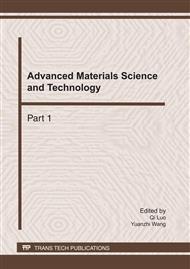p.770
p.776
p.782
p.787
p.792
p.799
p.804
p.809
p.814
“Nonintelligective Factors Inducing Scenario” Teaching Paradigm Developed and Applied Research
Abstract:
Nonintelligective factors inducing scenario, as a new teaching paradigm of teaching model, compared with the traditional teaching model is a kind of innovation and development, which is a more effective teaching model. This paper is based on scenario cognitive theory, which put forward the dynamic relationship model of the nonintelligective factors inducing scenario teaching paradigm, and emphasizing the teaching of both dynamic learning and the non-intellectual factors in learning, in order to stimulate strong interest of learners’ and increase participation. In the teaching process, it emphasizes more on the creation of scenarios, learning motivation and feedback behavior of learners’, in order to improve teaching effect.
Info:
Periodical:
Pages:
792-798
Citation:
Online since:
January 2011
Authors:
Price:
Сopyright:
© 2011 Trans Tech Publications Ltd. All Rights Reserved
Share:
Citation:


